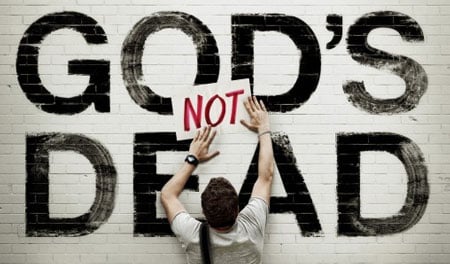
Over at the The Gospel Coalition, Andrew Barber just penned a screed against Christian films, calling them “inherently dishonest” and concerned with “egoistic castle-building.”
Why are Christian films inherently dishonest? Because they tend to contain conversion narratives (yes, that’s his argument). He calls this a “bait and switch,” where Christians purport to present art but are instead scenes “more akin to interventions than filmmaking.”
Why are Christian films exercises in “egoistic castle-building?” Because they are “evangelical fantasies” that tell apparently unrealistic stories like a college freshman besting a “learned” college professor in debate.
I find Barber’s piece singularly unconvincing. It is, however, fairly representative of other critiques of the new wave of Christian films — including this gem from a guy who panned the movie God’s Not Dead because it didn’t square with his experience at the University of Missouri-Kansas City, where there are apparently “rock stars” in the philosophy department. (I’m confused. Does his experience mean that contrary experiences aren’t valid?)
Look, I get that there are people who see God’s Not Dead or other Christian films and just don’t like the movies. Maybe the movies feel too preachy to them. Or maybe they don’t like the script or the performances. But ascribing moral defects to the filmmakers? That’s a bit much.
First, creating good art is hard. Barber displays zero appreciation for that rather salient fact. Many of these Christian films are being made with folks who are relative rookies in the movie world, without the benefit of the vast experience and talent of Hollywood. And because creating good art is hard, I always appreciate a bit of humility in critics and rarely find truly acerbic reviews to be amusing or interesting. I don’t mind being acerbic about vile messages, but the quality of the art? If it’s so easy, go create some yourself.
Second, calling Christian movies dishonest is . . . strange. Did any sentient person walk into God’s Not Dead and think, “Whoa! I thought this was an art house flick about debating Nietzche! WTF!?!” Of course not. The movie was marketed as a Christian film, by Christians, largely to Christians.
Third, I highly doubt that that critics like this have uniformly reviewed lefty “message films” in such a scornful manner. Are those kinds of films dishonest? Again, of course not. There is nothing dishonest about making a movie that advances your most dearly-held beliefs. “Message films” have a long history in the movie business. Some are good. Some are bad. In fact, there are Christian filmmakers who would feel dishonest if they didn’t include a gospel message.
Fourth, when Barber talks about God’s Not Dead as some sort of “egoistic castle-building” because it’s projecting heroic versions of ourselves where “college freshmen can defeat learned college professors in debate,” I’d like to invite this guy to the real world. At the end of God’s Not Dead, the filmmakers list dozens of legal cases where young students face off against “learned” professors and ultimately prevail. Moreover, many of these professors aren’t “learned” but instead are sneering simpletons. How do I know this? I was lead counsel on most of the cases listed in the credits.
In those cases, one professor called a Christian student a “fascist bastard” and refused to grade his work (“learned?”). In another, a professor tried to force a student to publicly advocate for gay rights and when she refused a board of professors told her she couldn’t graduate unless she changed her values (“learned?”) We had one professor instruct her students to engage in same-sex sexual behavior in public then write about the reaction of the rubes around them (“learned?”) In another case, we discovered that a school was weeding out any Christian applicant who mentioned God in response to the question, “What’s most important in your life (“learned?) I’ve seen college freshman do far more than defeat college professors in debate. I’ve seen them confront those professors in university tribunals and in federal court, winning both places.
Fifth, when Barber talks about the kinds of films he’d like to see – dealing, for example, with atheists “smarter and more ethical” than Christians or pastors “formerly powerful in the Republican party” – he’s just calling for more of what the world gives us every day. The last thing we need is more movies (or other forms of pop culture) talking about how stupid and narrow-minded Republican Christians are, especially compared to their atheist betters.
Don’t take any of the statements above to imply that any given Christian film is a “good movie” (See my first point), and Christian films aren’t generally my cup of tea (not violent enough), but it is unseemly to seek out moral defects in people who are — by and large — trying their best to make good art that expresses their deepest beliefs.
Finally, there are a distressing number of Christians who are overly-impressed with our secular institutions. When it comes to the academy (the subject of God’s Not Dead), these Christians fail to see the reality – that modern scholars in the humanities are largely a group of petty emperors wearing not a stitch of clothes. I’m not sure why many of our purportedly “thinking” Christians are so easily fooled. Is it pride? Is it foolishness? Is it the lust for secular recognition and power? Or are they simply not smart enough to see through the nonsense?
Whatever the reason, the resulting critiques of Christianity are as tiresome as they are predictable.
Go see Christian movies. Or don’t. But will the critics please spare us all from their self-righteousness and condescension?
Read more on the Patheos Faith and Family Channel and follow David on Twitter.
SEE ALSO: Why “The Giver” is the Best “Christian Film” since Narnia









